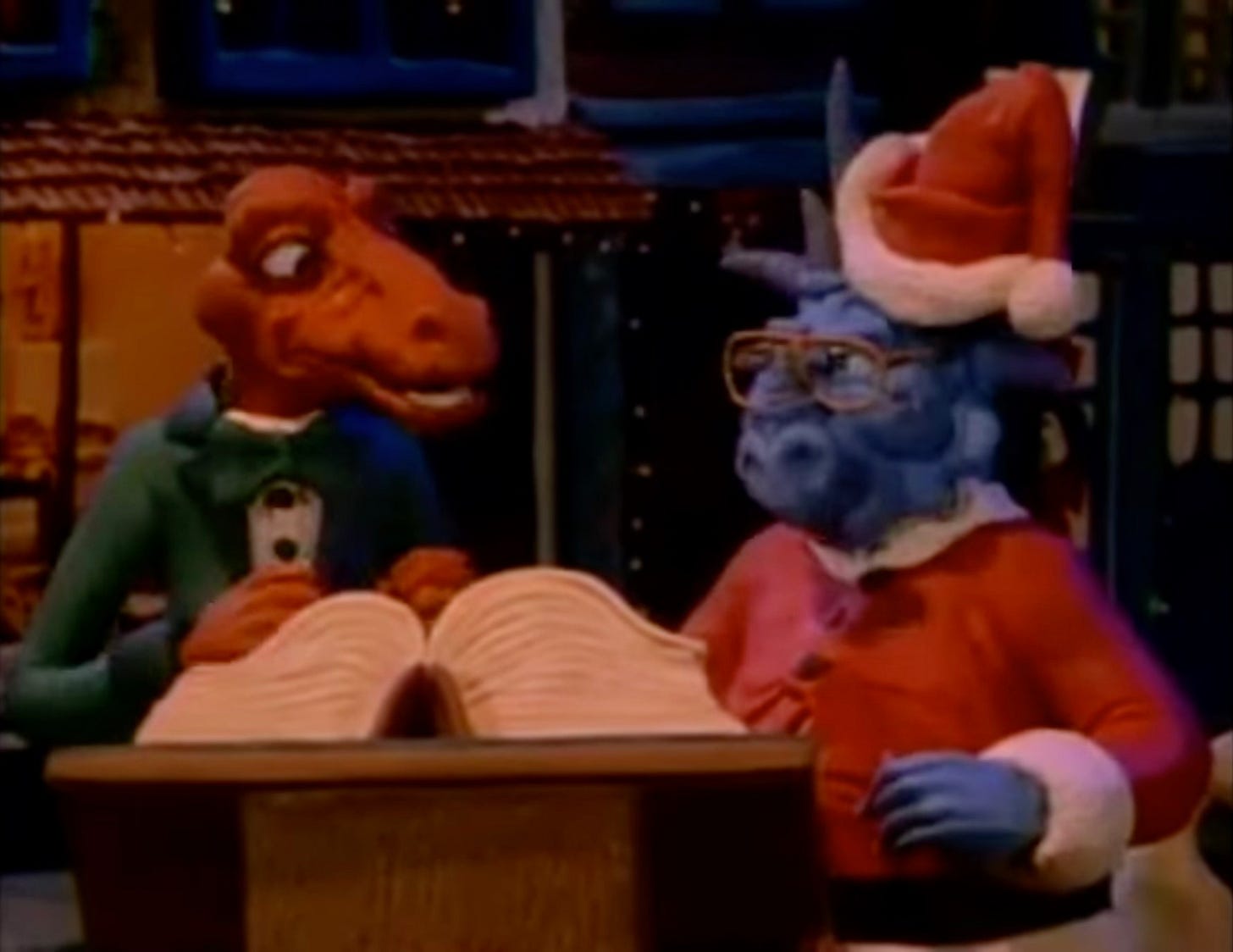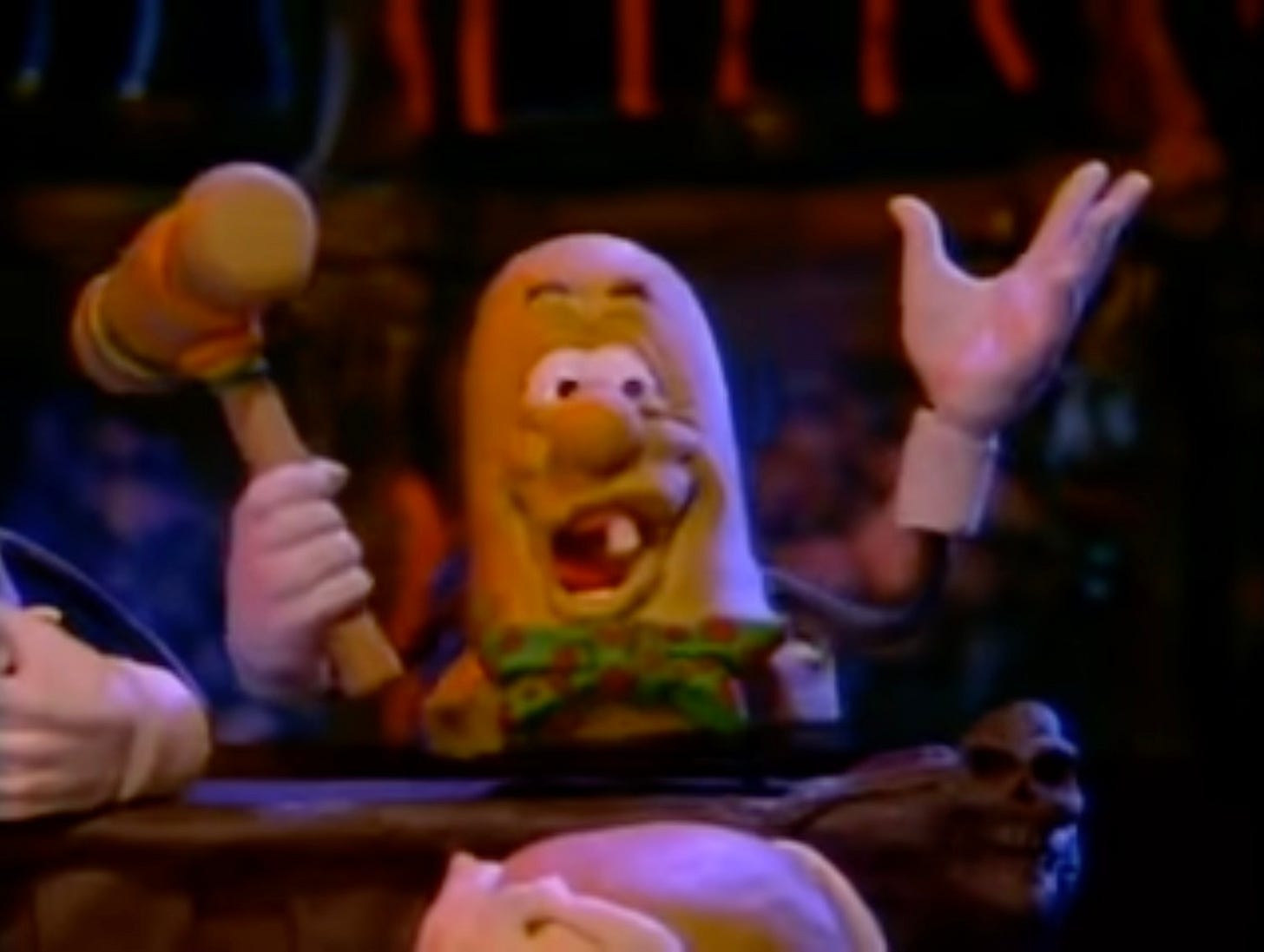The Sublime Silliness of ‘A Claymation Christmas Celebration’
Here it comes a-waffling …
Christmas specials peaked in 1987. The greatest holiday special of all time, A Muppet Family Christmas, debuted that year, as did another exquisite gem, the grand feat of clay known as A Claymation Christmas Celebration.
They reached the pinnacle. There is nowhere higher to go. All subsequent holiday specials must content themselves with living in their shadow.
I revisited A Muppet Family Christmas last year, so now it’s time to view Christmas in Claymation.
Directed by Will Vinton and written by Ralph Liddle, Claymation Christmas adopts more of a variety show format, featuring new renditions of classic Christmas carols against the backdrop of stop motion animation. For a framing device, two hosts shepherd us through this musical half-hour.
But who is fit to host such an event?
A couple of dinosaurs. Obviously.
Rex and Herb are not merely hosts; they are an unwitting comedy duo. Rex is dignified. Herb gets distracted by desserts. Friction results.
And friction explains why this whole special is so much fun. The most memorable segments center on some sort of conflict. They’re simple conflicts, but conflicts nevertheless.
Christmas carols alone would be merely nice. Random silliness could be entertaining but ultimately pointless and forgettable. Claymation Christmas injects just enough story to glue it all together into a greater whole.
The framing device includes a recurring gag in which various characters keep singing the wrong lyrics to “Here We Come A-wassailing.” They waffle, they waddle, they wallow, but no one seems to wassail, much to Rex’s annoyance. Rex, like any self-respecting dinosaur, is determined to ensure a linguistically precise holiday celebration.
For the musical numbers themselves, the special kicks things off with “We Three Kings,” in which the three kings attempt to sing a traditional version of the song while their camels opt for a livelier doo-wop style. Which will win out in the battle between old and new music? Naturally, the three kings succumb to doo-wop.
Next, “Carol of the Bells” takes a cue from The Muppet Show’s Marvin Suggs and his Muppaphone. But instead of the conductor striking the anthropomorphic bells, the bells strike themselves—except for the incompetent one, who just can’t seem to get it right, earning him the conductor’s ire. Bells striking themselves? A fun, silly idea. But a bell who can’t manage even that? Now it’s a fun, silly short story.
Later, we get an instrumental version of “Angels We Have Heard On High.” And what could possibly fit such a song better than walruses and penguins? The penguins simply want to play on the ice, but they find a lonely male walrus skating on their pond. A female walrus catches the male’s eye, and a ballet-style courtship commences—and creates havoc for the penguins.
No Claymation musical celebration would be complete without the California Raisins, one of those oddities of the ’80s I can’t explain even though I firmly latched onto the grapevine at the time. I even had figurines of them. Because nothing excites the imagination of a young kid more than dried grapes who perform covers of Motown.
Anyway, the California Raisins contribute “Rudolph the Red-Nosed Reindeer” in their bluesy way, forcing the role of Rudolph upon one of their number. Much like the original Rudolph, this raisin gradually comes to embrace his place in history.
The two remaining segments opt for nice and heartfelt rather than absurd, which helps balance the show out. “O Christmas Tree” takes us inside several Christmas tree ornaments, revealing worlds within worlds. A jazz-style “Joy to the World” breaks from the Claymation mold and takes its animated inspiration from stained glass windows. Neither has any real narrative, but since the rest of the segments do, these two work as interludes.
So, Claymation Christmas and A Muppet Family Christmas represent the apex. You can try to develop a better Christmas special—you should try—but you will not succeed, barring a miracle of some sort.





Vinton doesn't get a lot of respect despite his work receiving Emmys and whatnot; possibly the fact that he restricted himself to specials rather than series was the reason.